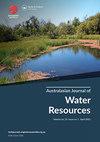Racialized water governance: the ‘hydrological frontier’ in the Northern Territory, Australia
IF 2.2
Q2 WATER RESOURCES
引用次数: 7
Abstract
ABSTRACT Increased scrutiny and contestation over recent water allocation practices and licencing decisions in the Northern Territory (NT) have exposed numerous inadequacies in its regulatory framework. Benchmarking against the National Water Initiative shows that NT lags behind national standards for water management. We describe key weaknesses in NT’s water law and policy, particularly for Indigenous rights and interests. NT is experiencing an acceleration of development, and is conceptualised as a ‘hydrological frontier’, where water governance has institutionalised regulatory spaces of inclusion and exclusion that entrench and (re)produce inequities and insecurities in water access. Regulations demarcate spaces in which laws and licencing practices provide certainty and security of rights for some water users, with opportunities to benefit from water development and services, while leaving much of NT (areas predominantly owned and occupied by Indigenous peoples) outside these legal protections. Water allocation and planning, as well as water service provision, continue to reinforce and reproduce racialised access to (and denial of) water rights. Combining an analysis of the law and policies that apply to water for economic development with those designed to regulate domestic water supply, we present a comprehensive and current picture of water insecurity for Indigenous peoples across the NT.种族化的水治理:澳大利亚北领地的“水文边界”
北领地(NT)最近水资源分配实践和许可决定的审查和争议日益增加,暴露了其监管框架中的许多不足之处。以国家水资源计划为基准,表明北领地在水资源管理方面落后于国家标准。我们描述了北领地水法和政策的主要弱点,特别是在土著权利和利益方面。北部地区正在加速发展,并被定义为“水文前沿”,在那里,水治理将包容和排斥的监管空间制度化,从而巩固和(重新)产生水获取方面的不平等和不安全。法规划定了一些空间,在这些空间中,法律和许可做法为一些用水者提供了权利的确定性和安全性,使他们有机会从水的开发和服务中受益,而将北部地区(主要由土著人民拥有和占领的地区)的大部分地区置于这些法律保护之外。水的分配和规划,以及供水服务的提供,继续加强和再现了获得(和拒绝)水权的种族化。结合对适用于水促进经济发展的法律和政策与旨在规范家庭供水的法律和政策的分析,我们呈现了整个北部地区土著人民水不安全的全面和最新情况。
本文章由计算机程序翻译,如有差异,请以英文原文为准。
求助全文
约1分钟内获得全文
求助全文
来源期刊

Australasian Journal of Water Resources
WATER RESOURCES-
CiteScore
5.10
自引率
21.90%
发文量
25
期刊介绍:
The Australasian Journal of Water Resources ( AJWR) is a multi-disciplinary regional journal dedicated to scholarship, professional practice and discussion on water resources planning, management and policy. Its primary geographic focus is on Australia, New Zealand and the Pacific Islands. Papers from outside this region will also be welcomed if they contribute to an understanding of water resources issues in the region. Such contributions could be due to innovations applicable to the Australasian water community, or where clear linkages between studies in other parts of the world are linked to important issues or water planning, management, development and policy challenges in Australasia. These could include papers on global issues where Australasian impacts are clearly identified.
 求助内容:
求助内容: 应助结果提醒方式:
应助结果提醒方式:


